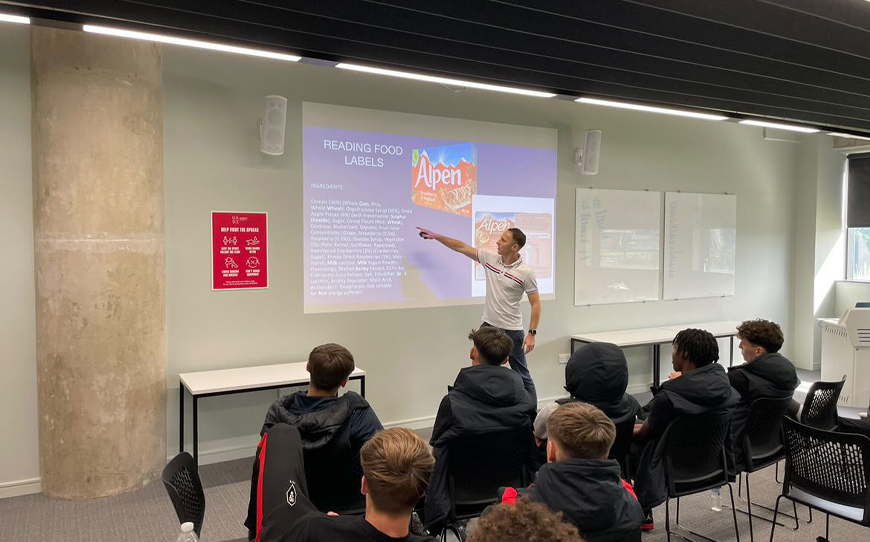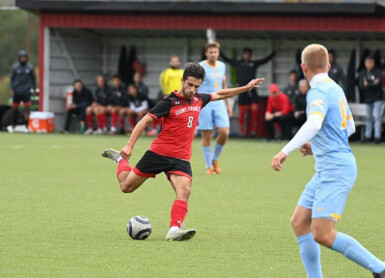As a player, Marc Pugh enjoyed a hugely successful career, progressing through the English football pyramid with Eddie Howe’s Bournemouth, going from League One, all the way to the Premier League.
Now, following his retirement in 2021, the 35-year-old has quickly found himself a new role within the game as a Nutritionist and Online Health Coach, working with young athletes to help mould them into the best possible versions of themselves, and maximise their sporting performance.
Marc has recently partnered with LFE to deliver Life Skills sessions to young apprentices throughout the EFL, and Touchline went to catch up with the Foodie Footballer himself…
So, Marc, tell us a bit about what you do?
“I’ll go into the football clubs, do a little presentation that focuses on nutrition. Some of the topics we cover are your proteins, your fats, your carbs and living a healthy lifestyle, which ties in really well with your mindset. If you’ve got a good mindset and you’re living in the right routine, your nutrition is going to take care of itself., because with everything it’s all about consistency and having good habits. So, we’ll do the presentation with the apprentices, I’ll then open the room up for any questions they have and then we’ll go and do a practical session in the kitchen, and I think that hands on approach, the lads really enjoy it because they realise how easy it is to cook simple healthy meals. Lately we’ve been focusing on healthy pancakes because in my eyes it makes a great pre- and post-match meal, and a great snack. It ticks all the boxes with your macronutrients as well. I’ve had some good feedback and it’s been really enjoyable.”

Why did you choose to become a Sports Nutritionist in your post-football career?
“Later on in my career I made the decision I wanted to be a Health Coach. I wanted to educate people on how to become the healthiest versions of themselves, so when I was 26, I decided to do an 18-module diploma in Nutrition whilst I was still playing because I wanted to gain that extra edge.
“We got promoted to the Championship at the time with Bournemouth and the step up from League One to the Championship is a big jump, so I started fuelling properly for performance and recovery and started eating the right foods, sticking to whole foods and watching my hydration. My attention to detail was ridiculous. I went from running 10 or 11k to 13 or 14k in my games and it made a huge difference, just from being really regimented in what I ate. Since then, I’m just obsessed with what I put in my body.
“I then decided to set up ‘@TheFoodieFootballer’ on Instagram at the age of 33 when I was still playing at QPR because I knew I wasn’t getting any younger and I needed to think about life after football as well and a lot of people took to it, so I thought ‘this is what I want to do’.”
After doing your Nutrition course, how long did it take for you to notice a difference in your performance?
“Not long. I remembered I really began to implement it at the start of a pre-season. In the off season, you can either go one way or the other, so I started getting fit and building myself back up for pre-season by making sure I ate well in my time off because sometimes you have a little bit of a blow out, but I thought ‘no, I’m going to be really strict and fuel myself well’ and I went into pre-season feeling brilliant, absolutely amazing. Usually, you’ll get the odd knock or two, but I wasn’t picking up any injuries, wasn’t feeling as sore and then went into the season running so much further, my highest speed was better and wasn’t as sore after gym sessions. I just felt so much better.”

How much do you enjoy delivering your Life Skills programme to the apprentices?
“I absolutely love it. I love helping other people. When I get a message from someone saying ‘I tried one of your recipes and it really helped me’ it’s like scoring a goal, you get a real buzz off it. It’s just nice to give something back and I know how important it is. Looking back, I wish I began educating myself on Nutrition when I was a little bit younger, then maybe I’d of climbed the ladder a little bit faster than I did. I didn’t get to the Championship until I was 26-years-old, so yeah it made a huge difference to me, and I want to give them the education that they deserve so they can take their game to the next level.”
Have you always been passionate about food?
“I think almost everyone loves food (laughs), but I always relied on other people to provide food for me at the time. My wife, she was doing all the cooking until I started educating myself, then I realised how important it was to not just know about food but understand what oils you were cooking with, the amount of fats, carbs and protein I was getting. I couldn’t boil an egg until I was 26, but then I started improvising and getting involved in the kitchen because we had two children at the time, so I needed to help in some way in the kitchen because my wife was doing everything else. I eventually found it was my way of switching off because football is full on. If you’ve had a bad game, you don’t want to beat yourself up about it and likewise, if you’ve had a good game you don’t want to get too ahead of yourself. I just really grew to love it.”
How are your Life Skills sessions received by the apprentices?
“When I’ve done practical sessions especially, I’ll get pictures through from some of the lads that evening telling me they’ve made the pancakes and that they’ve really enjoyed them and they’re all surprised because we weren’t using flour, we weren’t using sugar, no butter, all these unhealthy ingredients. It shows how amazing pancakes can taste using things like oats, bananas, natural sugars and maple syrup. Just creating healthy, nutritious meals that are going to help fuel your performance and recovery. I’ve had some really nice feedback, it’s been engaging, I’ve had lots of questions after the sessions. The lads buzz off the practical, they really do.”

How crucial is it for the apprentices to get into good habits early?
“It’s massive in terms of longevity especially. With them, I focus on fuelling for the season, not just for one performance. It’s easy to put a load of sugar in your body to get through a game, but you must think about the knock-on effects. As I always say: ‘a healthy athlete makes a great athlete’.
“You look at the old school players for example, those in the 70’s and 80’s, they come out of the game and because they’ve not lived the right lifestyle, they just put lots of weight on. However, the modern-day players now, they’re really lean, strong and playing for longer and longer. Just look at the likes of Zlatan Ibrahimovic and Cristiano Ronaldo, they treat their body and what they put in it like an actual job, so it’s important that I drill it into the lads and explain that if they want to have a long and successful career without loads of injuries, what we put in our body is massively important. Improve the small percentages daily, whether that’s your nutrition, whether it’s your sleep and you’ll see a big difference.”
What does a good nutrition plan look like for a footballer?
“Well, I don’t claim to know everything (laughs), and everyone is different, but for instance on a day off for example I’d reduce your carbs, increase protein intake and healthy fats. I’d focus on getting a good source of protein such as eggs, avocado, mushrooms, tomatoes. Just try to keep the carbs relatively low, because if you’re having a rest day you won’t be as active, so you don’t need to be loading up on the carbs.
“Then on a game day or training day, you should be ramping up your carbs. For example, brown sourdough bread, wholemeal pasta and things like honey to top it all up. I try to not focus on too much protein on game days because it can lead to feeling a bit bloated. So, for me, the closer it got to a match, I’d slowly reduce the amount of protein I was taking in, but at the same time really start loading up on the carbs.
How important is nutrition for recovery?
“So important. Back in the day when I was a little bit younger, I’d celebrate a game with a takeaway after, something like a Chinese but the inflammation won’t go away. After a match or training we have this inflammation sat in our body and if we have an unhealthy takeaway, we’ll still have it the next day. Then, on Sunday, we might have a Sunday roast and then on Monday it gets to training time and we’re still suffering with a lot of DOMS (Delayed Onset Muscle Soreness) and then there might be another match on Tuesday and you suffer for it.
“But, if you’re having a good nutritious meal within two hours after the game full of healthy sources of proteins and fats, loads of fibres, vitamins and minerals then your recovery rate can improve up to 150%, which is a huge difference. However, it’s not just your nutrition that aids recovery, it’s your sleep, yoga, hydration… all these things.”
How rewarding is it seeing your work benefit others?
“It’s very rewarding. When I was playing, I was doing it for myself, my family and teammates, but with this, I’m meeting people that I have never met before and making a difference in their lives. Some people I work with on my coaching app, even when they send me a message and tell me they’ve dropped a bit of body fat, I get a real buzz off it. It’s the same with my sessions. If I can help just one or two people in that room, then amazing. If I can help more, even better! I do genuinely just love it and it doesn’t feel like a job at all.”
This article features in Issue 44 of LFE’s Touchline Magazine.





